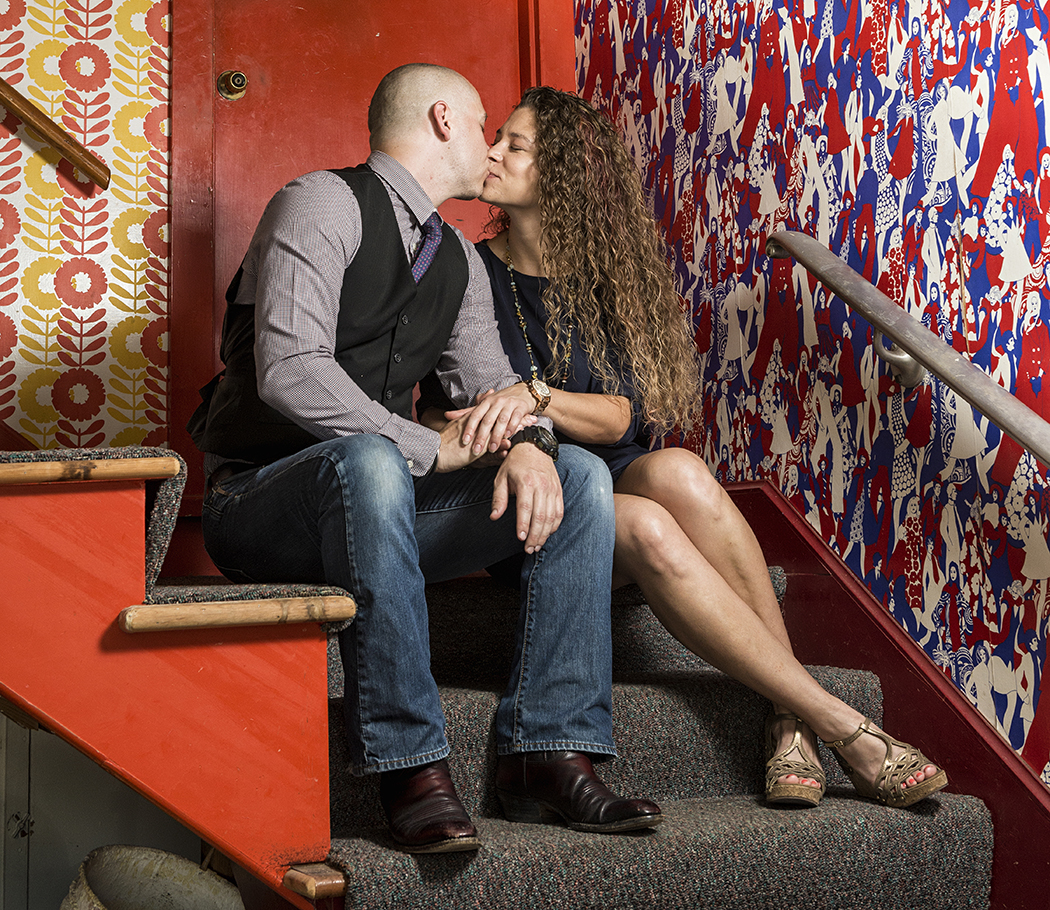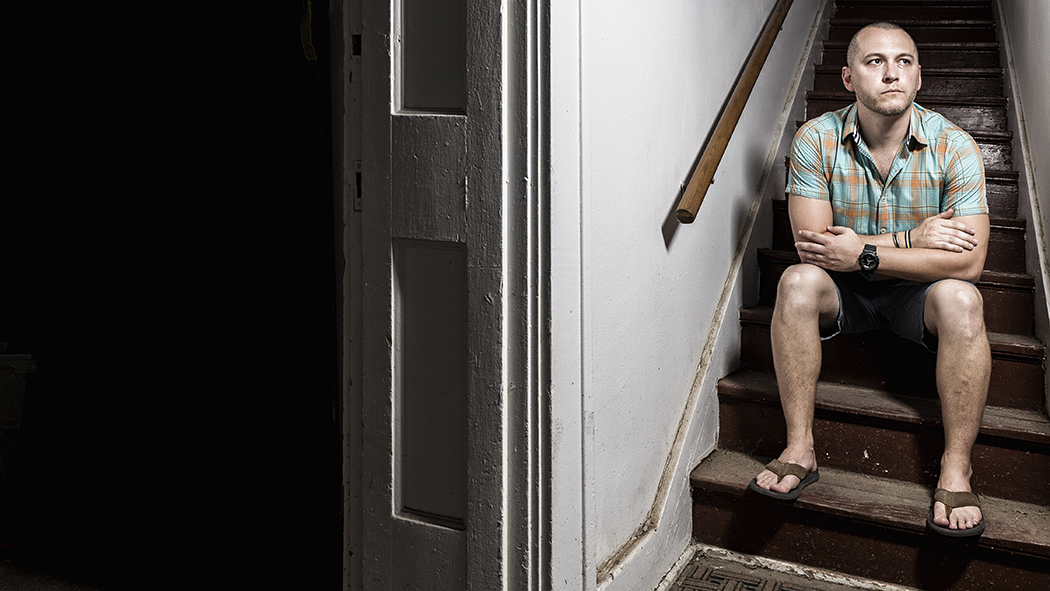
Lake Highlands’ Patty Pace gave boyfriend Adam Palmer a fighting chance after he was the victim of a brutal crime. (Photo by Danny Fulgencio)
When a vicious attack shattered his world and memories, she pieced him back together
They had known each other just nine months. She had only met his mother once, but now she stood clutching the woman’s hand over a hospital bed. Patty Pace had a choice to make. She could either commit to her new boyfriend’s recovery, a road with no guarantees, or she could walk away and go back to her busy life as a pastry chef and wedding cake designer.
“What kind of a person breaks up with a boyfriend because he got attacked?” she thought to herself. “There was doubt at times of whether I could do this. But I had to do it. I would want someone to do the same for me.”
But it wouldn’t be easy — the violent beating shattered his skull, leaving his memory and personality fractured. There were days he didn’t recognize her. Days he was angry and frustrated and looking to lash out. Days she questioned whether she could continue on as his caretaker. But, as in all good romance novels, love endured the chaos.
“I think we’re just so lucky to have each other,” the Lake Highlands High School grad says. “Not everyone is lucky enough to find their best friend through something like this.”
Pace met Adam Palmer at a friend’s Christmas party during the 2013 holiday season. It wasn’t love at first sight.
“When we first started talking, he was cocky. I don’t do cocky,” she says. But as the night went on, she saw a yang to her yin. “I am a really serious person and Adam was light. He’s the life of the party.”
The two started dating, casually. She loved his easygoing nature; he fell for her drive and passion. Then came the night of Sept. 11, 2014, when everything would change for Pace and Palmer.
The details are fuzzy between Palmer’s memories and police reports. Although Palmer initially had no recollection of the attack, he says his memories came flooding back a few months later, which can happen with recovering brain injuries.
Palmer stopped to cash a check, proven by a receipt time-stamped for 9:28 p.m., then headed home to take his puppy out before meeting a friend. Palmer works at the Aldredge House on Swiss Avenue and had just pulled up to the caretaker’s unit out back when he was attacked from behind. He says he was beaten by two men and was able to fight back, at first.
“And then two more guys came up,” he says. “One had a pistol.”
Palmer was beaten extensively with fists, the gun and a piece of firewood. He says he’s confident he would have been killed if the friend he planned to meet hadn’t driven up, causing the attackers to flee with his wallet and car keys.

Adam Palmer, sitting in stairwell where he was attacked, still struggles to regain his health and memories. (Photo by Danny Fulgencio)
According to the police report, Palmer was found at 9:45 p.m. clinging to the security bars on the garage door, bleeding from his ears and complaining that he couldn’t hear. Emergency services rushed Palmer to Baylor University Medical Center, where a coma was induced while doctors waited for his swollen brain to recede.
To date, police have not caught the men responsible for the crime.
Across town, Pace was in her Lake Highlands home when the phone rang.
“He just said, ‘Emergency, 911. Adam’s been attacked. Get to the hospital,’ ” she recalls. “I remember thinking I didn’t even know how to contact anyone. I didn’t have numbers for his mom or his dad or his brother.”
When she finally saw Palmer, he was comatose, machines sprouting from his mouth and nose to keep him breathing. “They told us to talk to him, so we did,” she says, remembering long hours in the hospital room with his mother, each holding one of Palmer’s hands. “We were just waiting, waiting, waiting.”
Palmer was confused and scared when he woke up two days later, pulling at the tube in his mouth. He had no idea what happened. He couldn’t remember his 30th birthday party that occurred a week before. He couldn’t remember large chunks of his childhood.
“My mom, my girlfriend and another friend were there, and I had no idea who they were,” Palmer says. “I had what’s called facial blindness. I couldn’t recognize them.”
Memory loss is one of the most common symptoms associated with severe head injuries, but no two cases are alike. Palmer had fractures on both the right and left sides of his skull, causing extensive damage to his frontal lobe, which controls both old and new memories. His top vertebra was broken. His ear canal was ruptured, resulting in severe hearing loss and permanent damage to his equilibrium.
“Nothing works right anymore,” Palmer laughs dryly.
Palmer’s family lived outside the city, and he was eager to stay close to his friends and his work, even though it would be months before he was back on the job. Pace considered what it would be to take him back to her family’s Flag Pole Hill home.
“He has all these medical problems. Can I really move him in?” she asked herself. “My mom, my grandmother and I just made it work. They were supportive because they knew I needed to do this.”
The three Pace women made a schedule to account for Palmer’s 24/7 care, which they tracked along with other vital health information in a binder by his bed. Palmer couldn’t walk, the damage to his inner ear threw him off balance. He was bedridden for weeks. It was months before he could walk unassisted. Cognitively, he lost his ability to easily retain new information; he now relies on endless Post-Its and reminders in his smartphone to keep track of his daily life.
“When he tried to start doing things for himself,” Pace remembers, “you’d literally have to call him, text him and make him write it down — multiple times. It was the only way he’d keep track.”
As with many head injuries, the attack sent Palmer’s moods spiraling. Once described as unflappable, he was now prone to fits of anger and despair.
“He gets set off really easily and you have to calm him down,” she says. “It’s been really hard on our relationship.”
It was like getting to know a new person, she says — a man who only vaguely resembled the man she once dated.
“He’s not the same person he was,” she says. “But he’s an amazing person. We’ve grown a lot. You get to know people in a really intimate way when you’ve seen each other at your most vulnerable.”
For months, the Pace family handled Palmer’s care themselves at their Lake Highlands home, but it became clear his progress was stalling. Pace implored Palmer to obtain further professional care. He sought a variety of physical and occupational therapies at Parkland Memorial Hospital, a helpful if halting experience, interrupted when he didn’t have the funds to pay.
“Every time he has any extra money he’s at Parkland paying his bill down,” Pace says.
Not only did the attack ravage his body and psyche, it devastated his finances. Lacking medical insurance, he racked up six-figure medical bills at Baylor, with additional ongoing medical expenses at Parkland. A GoFundMe account raised around $1,300 for his recovery, not nearly enough to keep creditors at bay, although it remains open for donations. It’s another thing that has to be considered before their lives can move forward.
“That’s not something that’s going to deter me from marrying someone,” Pace says. “I don’t see it as Adam’s debt, I see it as the attack’s debt.”
Palmer is still at the Aldredge House, with added security, but he dreams of becoming a Dallas Police officer. He can’t pass the physical exam, at least not yet. He’ll need hearing aids and surgery to fix damage to his left eye that makes it difficult for him to see. He still battles the insomnia and anxiety that comes with post traumatic stress disorder.
“It’s going to be many more years before I’ll be OK,” he says through tears. “I’ll never be 100 percent.”
The couple is struggling to find the new normal in the wake of violence, but Pace longs for a day when they won’t be defined by Palmer’s condition.
“I’m ready for our lives to get back to us and away from all these medical problems,” she says. “We’d like to move forward. We’d like to get married and have a kid one day. But right now it’s one day at a time.”
Palmer says despite all he has lost, he has gained a partner for life in Pace.
“I couldn’t ask for a better girl,” he says with a smile.





